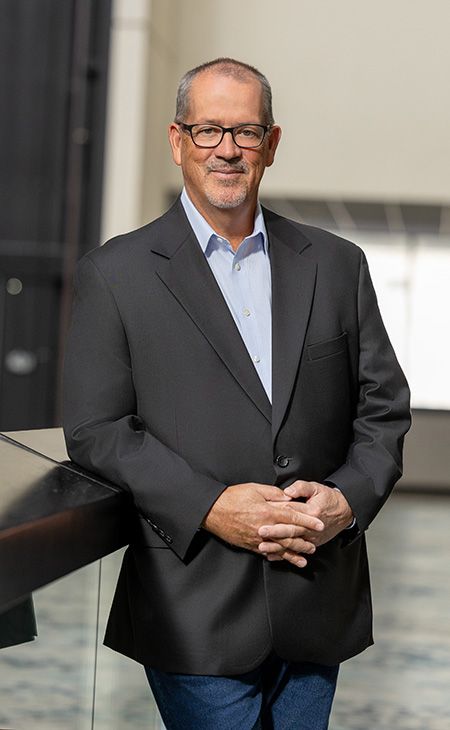A Rewarding Career

Partner, Barnes & Thornburg
A former mechanical engineer, Thomas J. Donovan '87 found his calling in the exciting world of intellectual property law.
Before he went to law school, Thomas Donovan ’87 was a mechanical engineer looking for more.
“I worked in the nuclear power industry, where I did piping stress analyses for nuclear power plants,” he says. “I began my career working as an engineer after studying engineering as an undergrad at the University of Illinois. I liked my job, but I found myself wanting more.”
Donovan heard that lawyers with engineering backgrounds were in high demand, so he enrolled at Chicago-Kent College of Law. It turned out to be a great move. Not only were there a copious number of opportunities, but he also enjoyed it.
“Dispute-related work captivates me more,” he says. “I find advising clients, earning their trust, and demonstrating the value of my services particularly rewarding and enjoyable.”
Donovan is now in his 25th year at Barnes & Thornburg in Chicago, where he advises on patent and trademark litigation and prosecution, unfair competition, and trade secret litigation, as well as a variety of licensing-related matters.
“The products and matters I handle depend on my clients’ needs,” he says. “These can range from NASCAR sports equipment to pharmaceuticals. I also work with clients in the software, marketing, and toy industries, exposing me to a wide range of technologies.
“Oftentimes, my job involves counseling clients who have made modifications to their technology that want to protect their intellectual property (IP) rights from the start. It may involve employing suitable agreements to provide such protection and often involves pursuing patent protection. Sometimes, the modification is very subtle but valuable. Other times, the modification may be very significant.”
When Donovan began his practice, he noted that many large law firms lacked IP departments, with most IP-related matters being handled by boutique firms. However, this landscape evolved significantly over the course of his career.
During a time when IP lawyers started leaving boutique firms to join larger firms and boutique firms were merging with larger firms in the 1990s and 2000s, Donovan joined Barnes & Thornburg, which is a national full-service law firm. He went from a 15-lawyer boutique to a then 270-lawyer firm with practices spanning various legal fields. During his 25 years with Barnes & Thornburg, the firm has grown from 270 lawyers to more than 800 lawyers.
The technology to be protected has evolved, too.
“It used to be a lot easier to understand the invention when you met with the clients and had the prototype in your hands,” he says. “Now, it often takes a lot more time to understand the background technology, as well as the new invention.”
Software has become more sophisticated by leaps and bounds over the last few decades, and helping companies license their software is one of his favorite aspects of the job.
“Licensing software is always interesting,” he says. “I’ve had several companies come in with new software technology at the startup phase and, over time, have had the pleasure of watching and helping them start their business and evolve into industry leaders. That’s been fun to watch.”
Donovan has also seen the evolution of Chicago-Kent.
When he attended Chicago-Kent, he was initially attracted by its legal writing program—the school didn’t have a major IP program at the time. The program has now grown to be ranked #18 in the country, according to 2024 U.S. News & World Report IP law program rankings.
Donovan has played a part in that success. For nearly 20 years, he returned as an adjunct professor to teach a course called Strategies and IP Law.
“It is intended to simulate a law firm environment where the instructors are partners of the firm and the students are associates,” he says. “The goal is to provide experience on everything from file intake, including clearing conflicts and engagement letters, to doing the substantive work that the hypothetical client needs. The work could also involve doing run-of-the-mill work for an existing hypothetical client or dealing with emergencies or urgencies for those clients or new clients. It’s that kind of a simulation that I enjoyed, and I think it is very pragmatic for the law students.”
Donovan originally conceptualized and taught the course with David J. Marr ’87, a member at Clark Hill who still teaches the course in the spring.
The two met as students at Chicago-Kent and have stayed friends, occasionally working on cases together throughout their careers.
“Tom conducts a thorough analysis of all the issues involved in a situation,” says Marr. “Because of that, he offers solid advice on how best to proceed to colleagues and clients.”
But it’s the 20 or so years that they spent teaching together that’s a real highlight of their friendship.
“We want at least one student every semester to come up to us and say, ‘This is the best course I’ve ever had in my school,’” says Marr. “The main reason I do this is because it’s really rewarding.”
“I think it’s important to educate young people [who are] hoping to get into the legal field,” adds Donovan. “I think you have to give back.”
Donovan has seen a lot of change during his career, but there is still one thing that stays the same: the fulfillment he feels from a job well done.
“The legal field is a very rewarding profession,” he says. “There are ups and downs, but I’ve always been proud of the field that I chose.”
